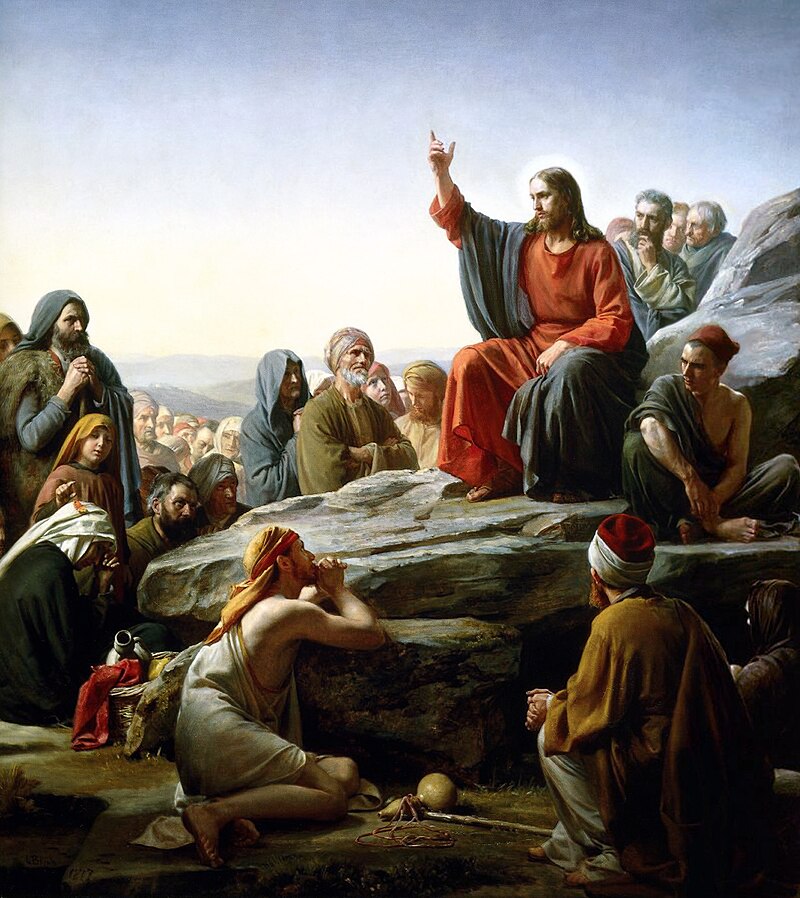In the Sermon on the Mount, the Beatitudes, as recorded in the Gospels of Matthew and Luke, Jesus taught his disciples as well as others what he considered to be the most important lessons by which to live.
Matthew and Luke agree on the general scope of the Beatitudes, though they differ on some particulars. Matthew, for example, records Jesus as having initiated the sermon with the comment, “Blessed are the poor in spirit, for of them is the kingdom of the heavens.” Luke records a terse, less confusing comment, stating simply, “Blessed are the poor, because yours is the kingdom of God.” Whereas Luke then records Jesus as saying, “Blessed are the ones hungering now, for you will be satisfied,” Matthew records a comment of more depth: “Blessed are those hungering and thirsting for righteousness, for they shall be satisfied.” Luke’s gospel has Jesus say, “Blessed are those weeping now, for they shall laugh,” while Matthew’s gospel says, “Blessed are the mourning, for they shall be comforted.”

The Beatitudes are mystifying in today’s world because they contradict everything that our modern world culture is based on: materialism, power, wealth, comfort, pleasure, entertainment, indulgence. Jesus blesses the poor, the weak, the sorrowful, the meek, and proclaims, in Luke, woe to the wealthy, the full, the happy, and the self-satisfied. And yet what do we see today, but that the rich and powerful seem to be experiencing something very different from anguish.
How, indeed, can the poor be blessed? The New Testament Greek word for poor is ptochoi, plural of ptochos, to crouch like a beggar, straitened, to be distressed, to be a mendicant. Why would Jesus bless such people? Because the poor have not yet been rewarded while the rich have? Because the poor are more aware of the simple blessings in life? Because there is a connection between material and spiritual poverty and according to Matthew one is blessed if spiritually poor?
Pre-modern poverty was characterized by no modern conveniences, by periodic bouts of famine, by recurrent hunger . . . and consequent humility and acceptance, among some, in the face of such uncertainty.
Famine, hunger, and poverty have declined in the modern world, which is materialistic in so far that constantly more items are acquired, wanted, hence there is a growing restlessness, lack of acceptance, and growing hubris as possessions provide false and fleeting self-esteem. A society therefore that declines in poverty and increases in wealth will decline in humility and increase in hubris. The pre-modern poor were desperate for food and shelter; the modern poor are desperate for wealth and power.
Jesus said, “you will always have the poor.” Indeed, there have always been poor and notwithstanding the plans of countless Utopian thinkers there apparently always will be. Why? In part because human society will never have answers to the questions of humans, “who live for a day.” Time dooms humans to ongoing anguish, because the future is never settled and clear, hence humans live a life of foreboding and fear that the next moment will bring suffering, war, disaster, and so on. So those with the most fear make sure they will never know such a day. Hence they plan and save and exploit and steal and whatever else to ensure that they will not be in want. In so doing they will take or keep what could be or belongs to another. In some ways we live in a world of material limits where there is enough for everyone in a communist society, but humans because of our peculiar temporal situation will never allow such a society to work–hence there will always be abundance for some and want for others.
The Apostle Paul of Tarsus, in his second letter to the Corinthians, echoed the teachings of Jesus in Matthew and Luke, proclaiming that God’s power is perfected in weakness. “For whenever I am weak, then powerful I am.” How great is the gap between the message of Christianity and the message of modern society and culture! How can weakness be better than strength, poverty better than riches? The New Testament has a disconcerting teaching: Woe to the rich, the filled, the laughing, for God does not bless these people–the beautiful, confident, powerful, and secure. God blesses, rather, the hungry, sick, suffering, the ugly, insecure, and frightened. Jesus tells adults to act as children before God. His teachings contradict what humans naturally strive for, to feel important, to be strong, to be seen as beautiful, to gain wealth and power, to find security.
Jesus’s great gift as a healer was his ability to see deep within the human psyche, to see that humans profess but do not feel so important, strong, wealthy, and powerful, because there is always present the fear that riches, power, beauty, and youth will vanish. His was a message of acceptance. Life is about acceptance, not resistance. Accept, he told his listeners, your lot, your poverty, your weakness, your ignorance, your nakedness, the thorns of your flesh, your ugliness, your obesity, your fears, your mortality, the fleetingness of life, the movement of time, the coming of death.
Deep down inside we all are poor. But this is a blessing. Beware being filled, because then one becomes like a Pharisee, satisfied, knowing. No, remain empty, remain poor, always await the reward. Humans are becoming, always in each and every minute. We are never satisfied, never have, never know, never filled, never rich, always just becoming. As riches increase, hubris increases, humility decreases. The very poor are the most open to God. When I am weak, then I am strong.
